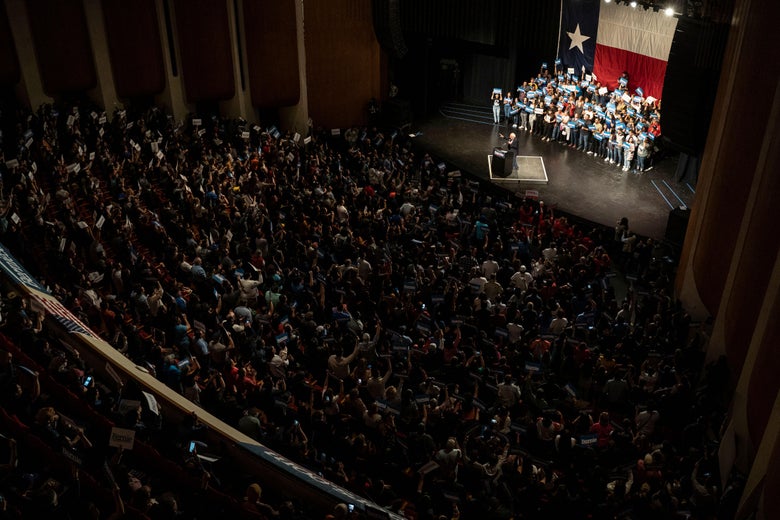
Democratic presidential hopeful Vermont Senator Bernie Sanders gestures as he speaks during a rally at the Abraham Chavez Theater on February 22, 2020 in El Paso, Texas.
PAUL RATJE/Getty Images
There were no caveats this time about a split decision or a disappointingly narrow margin of victory. Bernie Sanders won the Nevada caucuses on Saturday, cementing his status as the frontrunner for the Democratic presidential nomination.
No, let’s go farther than that: Barring a fundamental shift in the race, he’s 10 days away having the Democratic presidential nomination by the throat.
In a deeply unprecedented twist, it took a long time for a caucus state to tabulate its results. But networks didn’t need to see much before calling the race. Sanders’ numbers, according to entrance polls, were strong across the board. He led the field among men and women, voters with and without college degrees, very liberal and somewhat liberal caucus-goers, as well as even—narrowly—moderate and conservative caucus-goers.
He was winning two-thirds of voters between age 17 and 29, and nearly half of those between age 30 and 44. He won half of Hispanic voters—about 40 percentage points better than his nearest competitor—while only narrowly losing black voters to Joe Biden. Among the two-thirds of caucus-goers whose top priority was defeating Trump, Sanders narrowly edged out Biden.
The more cluttered results in Iowa and New Hampshire allowed for more spin opportunities for trailing candidates. There’s not much to spin in Nevada, though; the pile-up is for a distant second. Biden, at least, will show modest improvement as he heads into his last stand in South Carolina next week, a state he needs to win. Warren’s middling performance wasn’t as bad as it looked. With so many Nevadans having voted early, her strong debate performance on Wednesday night hadn’t fully registered in the results. She did better among those who decided in the last few days. Pete Buttigieg hung in there, but his 2 percent support among black caucus-goers tells you all you need to know about his chances in South Carolina. Tom Steyer, meanwhile, has to decide whether he would prefer Sanders or Biden to win South Carolina, and adjust his drop-out timing accordingly. And it’s getting to be about that time when the rationale for Amy Klobuchar staying in the race stops existing.
The next week could be the decisive one of the nominating process. It’s the week ahead of South Carolina, yes, but it’s also the last full week before Super Tuesday on March 3, when one-third of pledged delegates will be divvied up. If Sanders carries on at his current clip through Super Tuesday, he’ll build a significant delegate lead that would require another candidate to beat him not just repeatedly in contests down the line, but by wide margins. That’s unlikely.
What we should expect from rest of the field, if—if!—they’re interested in stopping Sanders’ imminent coronation instead of settling side beefs within “lanes,” is a sustained attack on Sanders.
As much fun as everyone had in this past Wednesday’s debate going after the low-hanging fruit in Michael Bloomberg, “Michael Bloomberg gets obliterated” is not the headline that’s going to drag Sanders’ numbers down, when his rivals’ immediate need is to drag Sanders’ numbers down. When Tuesday’s South Carolina debate comes, this will require the candidates to set aside some of their pride, or to look beyond their immediate interests in taking specific blocs of voters away from fellow trailing candidates. It will require Pete Buttigieg and Amy Klobuchar to not fight with each other the entire time, or for Michael Bloomberg, Joe Biden, and Tom Steyer (if he makes the debate) to not debate amongst themselves about whose record on race is the worst. And it will require Elizabeth Warren to train even an ounce of that hostility she directed at Bloomberg on Wednesday on Sanders, at the risk of inviting a backlash among the left.
In other words, things are only looking up for Bernie Sanders.
Readers like you make our work possible. Help us continue to provide the reporting, commentary and criticism you won’t find anywhere else.
Join Slate Plusfrom Slate Magazine https://ift.tt/2PeY9Yy
via IFTTT
沒有留言:
張貼留言